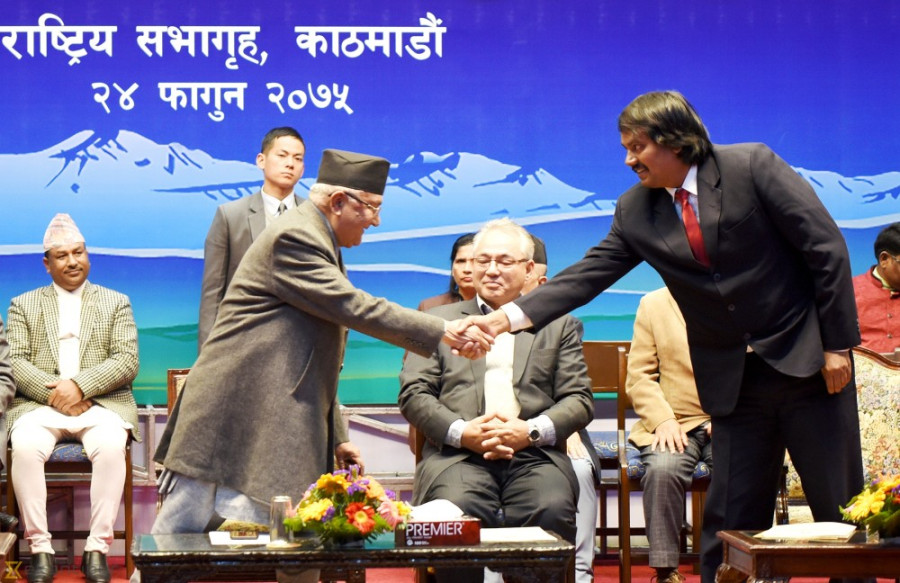Opinion
Hasty deal with Raut
The 11-point agreement signed between the government and the Alliance for Independent Madhesh came as a shock in the current political scene Key leaders of the Nepal Communist Party said they had no idea that such a pact was going to be signed, which calls into question the intention of the government
Kushal Pokharel
The 11-point agreement signed between the government and the Alliance for Independent Madhesh came as a shock in the current political scene. Key leaders of the Nepal Communist Party said they had no idea that such a pact was going to be signed, which calls into question the intention of the government. The opposition parties have condemned the deal, calling it a regressive move that will further destabilise the nation. What’s more, even civil society members have staged protests demanding a justification of the accord.
In a rather non-transparent manner, the government negotiated with CK Raut who has been advocating for a separate Madhes nation with its own territory and population. The Alliance for Independent Madhesh has been staging a non-violent protest against the state, accusing it of deepening racial discrimination in the country. It has also been reiterating that an increasing number of people in the Tarai want a separate state for the transformation of the region. Seeking international recognition, Raut has registered Madhesh as a separate nation in an international organisation named Unrepresented Nations and Peoples Organisation.
Immediately after Raut was released through a Supreme Court verdict, the government gave him a red carpet welcome in a bid to bring the disgruntled alliance into mainstream politics. While the government is projecting this event as an unprecedented success in ending the ongoing separatist movement in the country, other political leaders including the prime minister’s own party have vented ire and accused him of hastily reaching such an understanding without adequate consultations.
From the very first day of the signing ceremony, the deal has invited various controversies. In fact, both contracting parties have interpreted the deal as per their own convenience. This has made the situation even worse. Particularly, the second point of the deal has raised a huge debate. Though it is stated that both parties agree to resolve dissatisfaction seen in Tarai-Madhes through democratic means based on people’s mandate in the spirit of the constitution, the understanding of people’s mandate is different. The Alliance for Independent Madhesh has interpreted this clause as the right to hold a referendum in Madhes, whereas the government has rejected this statement outright saying that there is no possibility of a plebiscite.
Another facet of this political development is concerned with the question of why the government adopted a flexible approach to Raut’s faction but decided to treat another revolutionary party led by Netra Bikram Chand ‘Biplav’ harshly. With the cabinet’s latest decision to ban the activities of this party, an offensive strategy has been adopted. Bringing the Chand faction into dialogue seems to be nowhere in the government’s plan. Amid this scenario, criticism has mounted against the prime minister’s labelling this party as a ‘dacoit group’.
Subsequent to the prime minister’s much-touted success in the direction of consolidating the country’s sovereignty, independence and territorial integrity, news reports about Raut’s cadres conducting various activities against the spirit of the deal has flooded the media, posing a grave question over the sustainability of the pact. Critics argue that the attempt to establish CK Raut as a political celebrity overnight will prove costly for the nation if his alliance uses this agreement as an opportunity to further strengthen the separatist movement. With the agreement explicitly mentioning that no action will be taken against the alliance now, and that all past wrongdoings will not be liable to punishment, the alliance has been given freedom to propagate its ideals. The pact is mum on the pertinent question of what happens if there is a breach by either side.
Having said that, the Raut group has consented to abide by the constitution and respect the fundamental principles of people’s sovereignty, national independence and democratic norms and values. However, early indications are not welcoming. It will be too early to predict the outcome of this accord now. Hence, a critical time lies ahead in the current transitional phase of implementing federalism in Nepal.
The formal recognition of such a movement by the government has also raised the issue of how similar demands for regional autonomy and self-determination will be addressed in the future. As potential regional ethnic conflicts can’t be totally neglected in federal Nepal, the state needs to have a long-term plan before inking any deal of national significance. No less significant will be the state’s posture towards other revolutionaries emerging with various extreme demands. Instead of resorting to violence, the state needs to find a peaceful solution by conducting talks.
Pokharel is a member of the social science faculty at the Whitehouse Graduate School of Management.




 21.12°C Kathmandu
21.12°C Kathmandu










